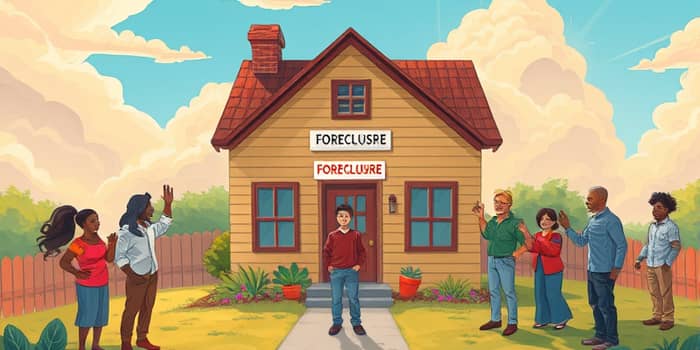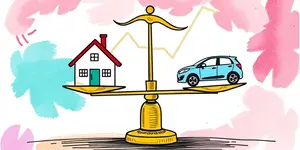Facing the possibility of foreclosure can feel overwhelming, but knowledge and early action can change outcomes. Foreclosure is not just a legal notice or a headline—it directly affects families, credit, and communities. By understanding the risks and options, homeowners can take empowered steps to protect their homes and financial futures.
In this guide, we’ll explore key definitions, processes, timelines, and practical strategies to navigate foreclosure. Whether you’re behind on payments or simply want to prepare for uncertainty, these insights will help you make informed decisions in critical times.
Understanding the Foreclosure Process
At its core, foreclosure is a legal process by which a lender reclaims a property when mortgage payments are not made. When a borrower misses payments—commonly for 120 days or more—the lender may initiate foreclosure to recover the unpaid debt. This involves selling the home, often at auction, to satisfy the outstanding loan balance.
Beyond the financial impact, foreclosure carries emotional weight. Families may feel uncertainty about where to live, and credit scores can be permanently damaged. Recognizing foreclosure as a manageable challenge rather than an insurmountable loss is the first step toward resolution.
How Foreclosure Unfolds
The journey into foreclosure typically follows a series of steps, each designed to give the borrower notice and an opportunity to catch up. Awareness of these stages empowers homeowners to respond quickly and pursue alternatives.
- Missed Payments: Falling behind on mortgage payments triggers the process. Most lenders allow about four months of delinquency before moving forward.
- Notice of Default: A formal notification that the loan is in default and that legal action may follow if payments are not made.
- Foreclosure Filing or Notice of Sale: In judicial states, a lawsuit is filed. In non-judicial states, the lender posts a sale notice per the mortgage contract.
- Foreclosure Sale or Auction: The property is sold to the highest bidder. If no satisfactory bid is received, the lender takes ownership.
- Eviction: Should the borrower remain on the premises, the new owner may initiate eviction proceedings to take possession.
Comparing Judicial and Non-Judicial Foreclosure
States vary in how foreclosure is executed, primarily through judicial or non-judicial processes. Each has unique timelines, borrower rights, and procedural steps:
Financial and Emotional Consequences
Foreclosure can leave a lasting mark on a homeowner’s financial health. Beyond losing a home, you may confront legal fees, inspection costs, and potential deficiency judgments if the sale does not cover the debt. These charges can total thousands of dollars, making recovery an uphill battle.
Moreover, a foreclosure remains on a credit report for seven years, affecting the ability to secure new mortgages, auto loans, or even rental agreements. With significant costs for the homeowner and long-term credit damage, the emotional toll can be heavy. Yet, understanding these consequences is vital for pursuing the best possible outcome.
Options to Avoid Foreclosure
Perhaps the most empowering insight is that foreclosure is not inevitable. Lenders often prefer alternatives to reclaiming and reselling a property. By taking proactive steps, borrowers can negotiate solutions and maintain their homes.
- Repayment Plan: Arrange to spread missed payments over time, bringing your loan current while staying on schedule.
- Forbearance: Seek a temporary reduction or suspension of payments to weather short-term hardships.
- Loan Modification: Work with your lender to adjust interest rates, extend terms, or change loan structure.
- Short Sale: With lender approval, sell the property for less than owed, avoiding formal foreclosure on your record.
- Deed-in-Lieu: Voluntarily transfer ownership to the lender, releasing you from further mortgage obligations.
State-Specific Regulations
Each state sets its own rules for initiating and completing foreclosure. Some states require mediation sessions, while others limit fees lenders can charge. Being aware of local statutes can provide extra time or additional avenues for relief.
Consulting a housing counselor or attorney familiar with your state’s regulations can reveal unique protections, such as mandatory waiting periods or counseling requirements, which could delay or derail foreclosure efforts.
Prevention and Support
No one expects financial hardship, but planning ahead can make all the difference. If you anticipate difficulty, reach out early. Many lenders offer loss mitigation programs that consider your situation and propose workable solutions.
Nonprofit credit counselors and HUD-approved agencies provide free or low-cost guidance. They can help you evaluate options, prepare documentation, and negotiate effectively with your lender. You’re not alone in this process—support is available.
Practical Tips for Homeowners Facing Foreclosure
When the stakes are highest, deliberate action matters. Keep these practical tips in mind as you navigate uncertain territory:
- Maintain open communication with your lender; document every call and correspondence.
- Review your mortgage agreement closely; know your rights and deadlines.
- Explore community assistance programs and local housing counseling services.
- Develop a realistic household budget to identify areas for savings.
- Keep all financial records organized; transparency builds trust with your lender.
Conclusion
Foreclosure may seem like an overwhelming threat, but with knowledge, preparation, and timely action, homeowners can navigate this process and find a path forward. Early intervention, clear communication, and professional support can transform a potential crisis into an opportunity for financial renewal.
Remember, understanding foreclosure can help you make empowered choices. Reach out to your lender or a certified housing counselor today—your home and credit future may depend on it.
References
- https://www.rocketmortgage.com/learn/foreclosure-definition
- https://www.investopedia.com/terms/f/foreclosure.asp
- https://www.lendingtree.com/home/mortgage/foreclosure-definition/
- https://www.consumerfinance.gov/ask-cfpb/how-does-foreclosure-work-en-287/
- https://upsolve.org/learn/foreclosure/
- https://www.alllaw.com/articles/nolo/foreclosure/how-does-foreclosure-work.html
- https://selfhelp.courts.ca.gov/foreclosures










